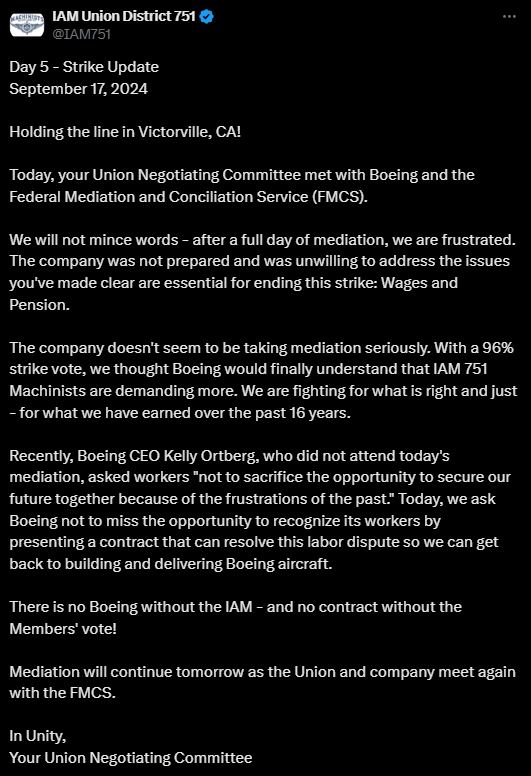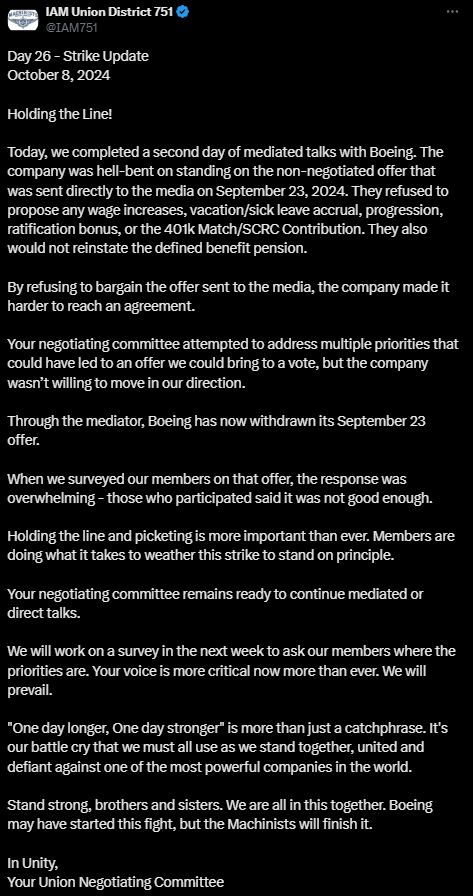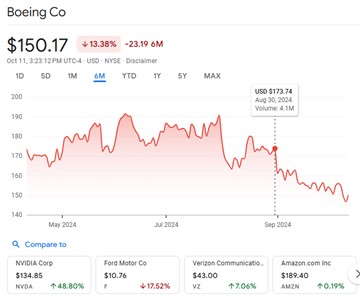WASHINGTON, D.C.—In a twist of events, The Boeing Company on Thursday, October 10, filed an unfair labor practice charge with the National Labor Relations Board (NLRB) against the International Association of Machinists and Aerospace Workers union (IAM), specifically against 751 president Jon Holden and W24 president Brandon Bryant alleging “bad faith bargaining.” The charge is related to activities in Seattle, Everett, Renton, Auburn, Fredrickson, Moses Lake, and Portland.

Boeing alleges in its case that the IAM union “violated its duty to bargain in good faith by engaging in regressive bargaining, surface bargaining, misrepresenting deal terms and negotiation status to its members and the public, and failing to bring representatives to the bargaining table with the authority to reach an agreement.”
Boeing added that IAM over the last six months has engaged in a “pattern of bad faith bargaining” and its “public narrative is misleading and making it difficult to find a solution for our employees.”
Boeing alleges that union leadership is engaged in an active misinformation campaign “aimed at obscuring its [IAM’s] own pattern of bad faith bargaining” filing documents obtained by the Lynnwood Times reveal.
“While we usually do not find it productive to file unfair labor practices charges, we have reluctantly decided to do so here—both to respond to the IAM’s legal filings, and to ensure the National Labor Relations Board and other interested parties have an accurate picture of the events of the past few weeks,” Boeing noted in its NLRB filing.
On September 8, IAM leadership endorsed a tentative collective bargaining agreement with Boeing that was rejected with a vote of 94.6% by union members on September 12, after which a strike commenced the following day.
Boeing asserts in its filing, that it has been and continues to negotiate in good faith with IAM and prioritized “reaching an agreement that would avoid a damaging strike.” The company alleges that union leadership intentionally launched a campaign “undermining” the “historic agreement” reached on September 8 to “actively” encourage its members to vote against “its own deal.”

“Union leadership, including members of its bargaining team, business representatives, and shop stewards, actively engaged in demonstrations in the Company’s plants, spread misinformation about what was in the agreement, and built a wave of opposition that all but ensured that the agreement would not be ratified. These steps represented a bad faith violation of union leadership’s representations at the bargaining table,” Boeing states.
Boeing further alleges that the actions of these actors contributed to a strike that caused “substantial harm to the Company and its employees, suppliers, communities, and customers around the globe.”
To combat alleged misinformation that the company is not actively negotiating with IAM since the September 13 strike, Boeing released that its “full authorized negotiating team” attended and participated in mediated bargaining with the Federal Mediation and Conciliation Service on September 17, September 18, September 27, October 7 and October 8.
According to supporting documents in its NLRB filing, Boeing alleges that union leadership refused “to counter or even engage” in discussions during its September 17 meeting. However, the union issued a statement that Boeing was “unwilling” to address issues and came “unprepared.”

“These statements were both false and violated the agreement the parties had made to conduct that session [September 17] confidentially,” Boeing asserts.
Because of “union leadership’s mischaracterization” of the September 17 session it claims, Boeing decided to present “a best and final offer to the union” on September 23 to bring a “swift end to a damaging strike.”
According to the “best and final” offer proposed on September 23, the average annual machinist pay at the end of the proposed 4-year contract would increase from $75,608 a year to $111,155. In its final offer to IAM 751 & W24 members:
- Boeing committed to building its next new airplane, in the Puget Sound region.
- A general wage increase of 30% over four years, up from 25%.
- A ratification bonus of $6,000, up from $3,000.
- A reinstatement of the Aerospace Machinists Performance Program (AMPP) bonus.
- A one-to-one match on the first 8% an employee contributes to Boeing’s 401(k) plan
- A lower cost share for health care
- A new employee annual floating holiday
Boeing alleges that union leadership violated its own Constitution by refusing to allow its members to vote on the September 23 proposed contract.
“IAM Constitution, Art. XVI, Sec. 4 (emphasis added). Despite this clear requirement, and the Company’s presentation of an offer to settle the strike, the union’s leadership did not put it to a vote,” Boeing wrote.
According to Article XVI Section 4 of the IAM Constitution: “A proposal to settle or declare off an existing strike must be presented at a regular or called meeting of a L.L., or a meeting of the members affected (as the case may be), and decided by majority vote, by secret ballot, of the members involved…”
Boeing added that its release of the terms of the “best and final offer” was not “underhanded or inappropriate” as claimed by union leadership to be “direct dealing” with IAM membership.
“The September 23 offer was made by Boeing after IAM leadership refused to negotiate in a mediation session; reflected substantial and good-faith movement on wages and benefits; and was presented to IAM leadership before Boeing made its terms public, as it had every right to do,” Boeing stated in its complaint with NLRB against IAM.
Boeing alleges that in its October 7 and 8 sessions, the company presented the IAM negotiating team “further improvements to retirement and incentives” above its September 23 proposal. This included “guaranteeing a portion of the AMPP” and increased “annual pension payments for those employees who had Boeing pensions.” Boeing claimed the negotiating team refused to budge and held to its initial position of a 40% increase to general wages and the reinstatement of its pension plan that union members voted to end in 2014.
“After two days of fruitless discussions, the Company withdrew its offers and ended mediation, rather than continuing to bargain against itself,” Boeing stated.
After Boeing withdrew its September 23 proposal on October 8 leaving 33,000 striking IAM workers awaiting “next steps,” it alleges that union leadership falsely claimed in a public statement to union members that the aerospace company was “hell bent” to stick with its September 23 proposal. Boeing further alleges that union leadership also misrepresented their improvements to retirement and incentives above the September 23 proposal as “meager.”

“The union then announced yet another survey of its members (its third since the strike began), confirming that it again failed to bring representatives to the bargaining table with a real intention to reach a deal,” the NLRB filing concluded.
“We really want to reach an agreement that offers our employees better pay and market-leading benefits, and we have listened to our employees on the importance of take-home pay and retirement,” Boeing released in a statement to the Lynnwood Times. “As a result, during the mediation this week, we made further improvements to the offer we extended on September 23. Unfortunately, the union did not seriously consider these proposals and continues to insist on unreasonable demands. The union’s public narrative is misleading and making it difficult to find a solution for our employees. We remain committed to reaching a compromise to end the strike.”
Since the September 8 initial collective bargaining agreement, that was rejected by IAM union members on September 12, a total of seven NLRB cases have been filed against Boeing by the machinist union: 19-CA-350078, 19-CA-350551, 19-CA-351089, 19-CA-351744, 19-CA-351967, 9-CA-352164, and 19-CA-352278.
Boeing Strike Highlights
Thirty members of the Congressional Progressive Caucus, led by United States Representative Pramila Jayapal (WA-07), called on Boeing and IAM 751 and W24 negotiating teams to “return to the bargaining table” following the aerospace company’s rescinding its “best and final” September 23 offer on October 8.
Representatives Rick Larsen (WA-02) and Suzan DelBene (WA-01) joined striking Boeing IAM 751 workers on the picket lines outside of Boeing’s Everett factory on Friday, September 27, to hear their concerns and to show support to union members’ efforts to negotiate a fair contract with Boeing.
Starting Tuesday, October 1, all 33,000 striking workers lost their Boeing-sponsored health care benefits and the company two weeks earlier began furloughing tens of thousands of additional employees—including executives and managers—effectively reducing their take home pay by 25%. Boeing has also instituted a hiring freeze and paused all pay increases for its salaried workforce.
According to the Seattle Metropolitan Chamber of Commerce’s report, in 2023, Boeing supported 82% of industrywide business revenues, 80% of total jobs, and 77% of total labor income generated by Washington’s $71 billion aerospace industry. An article in HR Digest estimates that Boeing is losing $100 million per day because of the strike.
With S&P Global and Moody’s lowering the aircraft manufacturer’s creditworthiness in April to BBB- (the firm’s lowest grade), the FAA capping 737 Max production to 38 planes per month, delays in 777X production, and setbacks meeting mandated international “greener” emission standards for its 767 aircrafts, the company may soon face a cash crunch as it burns through billions of dollars more than projected.
Boeing hasn’t reported a full-year profit since 2018, a year before two crashes of the 737 MAX jet that led to the grounding of the plane worldwide. Its stock has taken a 13.5% hit since September 3 (Fri, Aug 30: 173.74, Oct 11: 150.12), after Wells Fargo analyst Matthew Akers downgraded the company’s stock valuation stating a problem with free cash flow.

“Boeing carries about $45 billion net debt and (it) must address this before it kicks off the next aircraft development cycle,” Akers said, adding that cutting the debt would consume its cash flow through 2030, Reuters reports.
Jefferies analyst Sheila Kahyaoglu estimated that Boeing would take a $1.3 billion hit to free cash flow for each month of the strike, according to Barrons.
On October 8, Boeing announced its third quarter deliveries of 2024. Despite the strike, the company delivered a total of 116 aircraft during this period—737 (92), 787 (14), and 767 (6). Boeing is set to release detailed financial results for its third quarter on October 23, 2024.
Author: Mario Lotmore











2 Responses
The IAM should never have given up their pension! The Union has allowed the company to dilute the members classifications! The company has no respect for experience and the Union allowed it by not protecting specifics in their job classifications!
Boeing company is the one giving misinformation and demonstrating bad faith. How does a 30% pay increase get you from an average yearly pay of $75k to $111k? That would be closer to a 48% raise, and that would have been seriously considered.